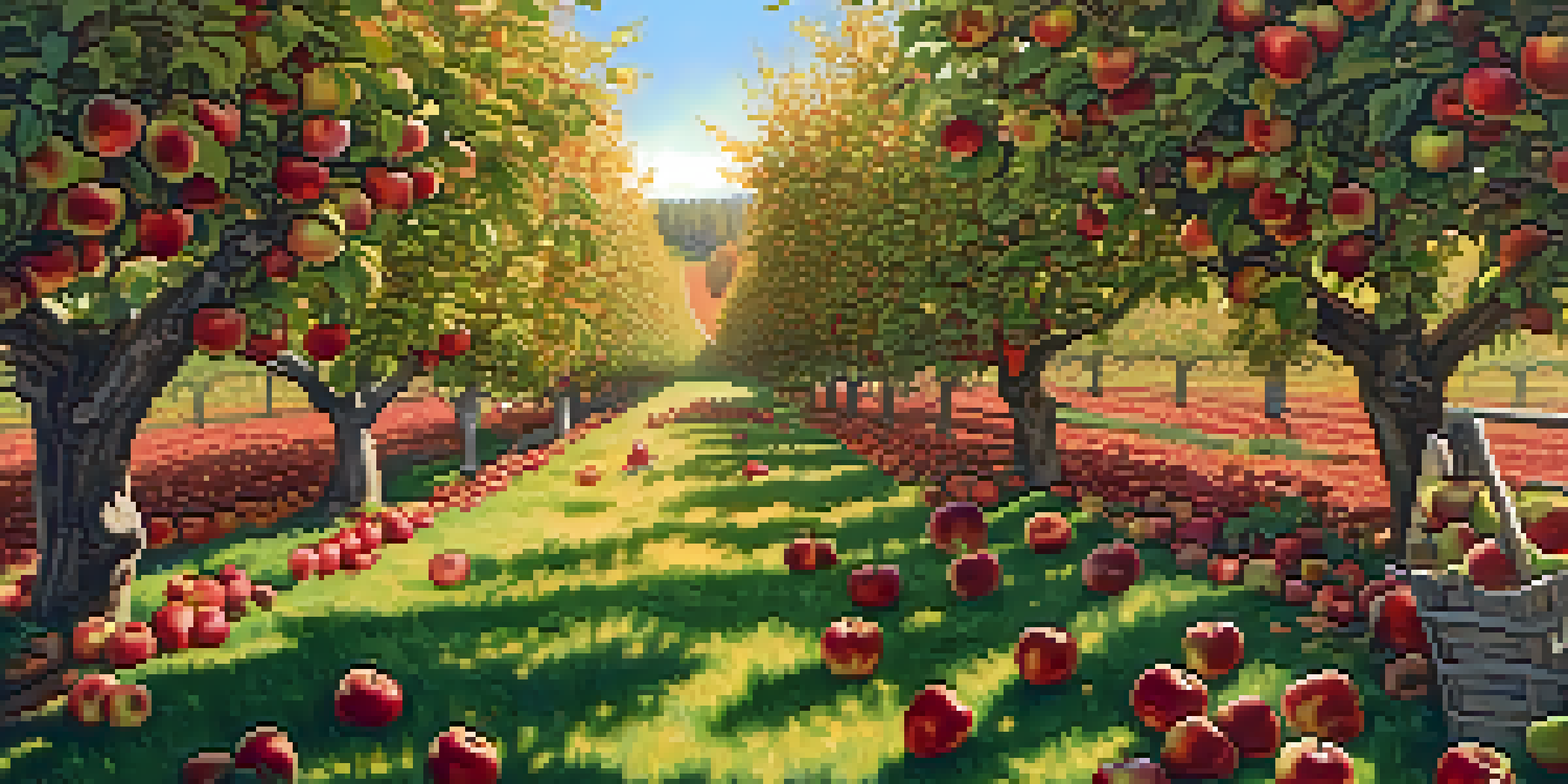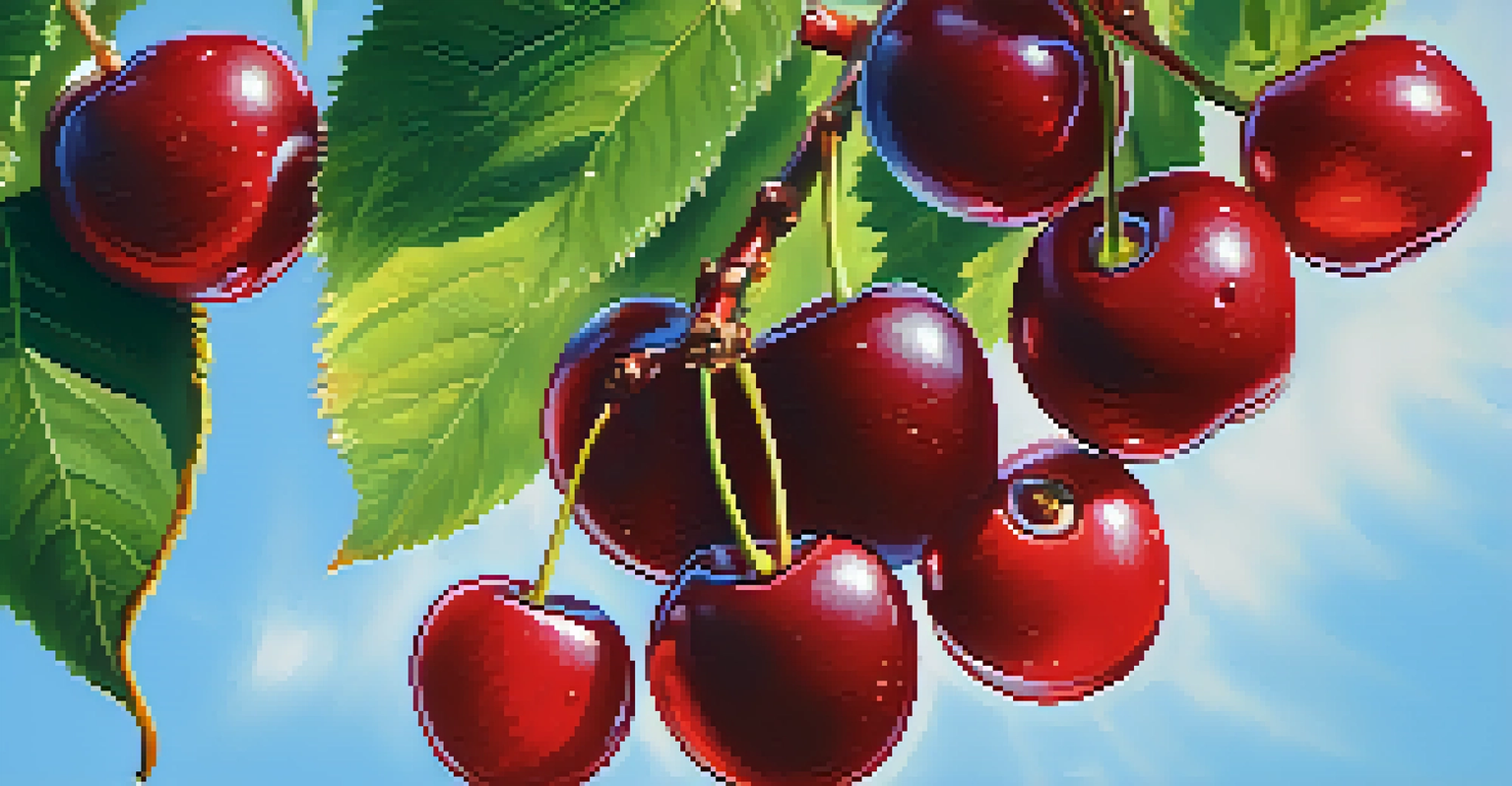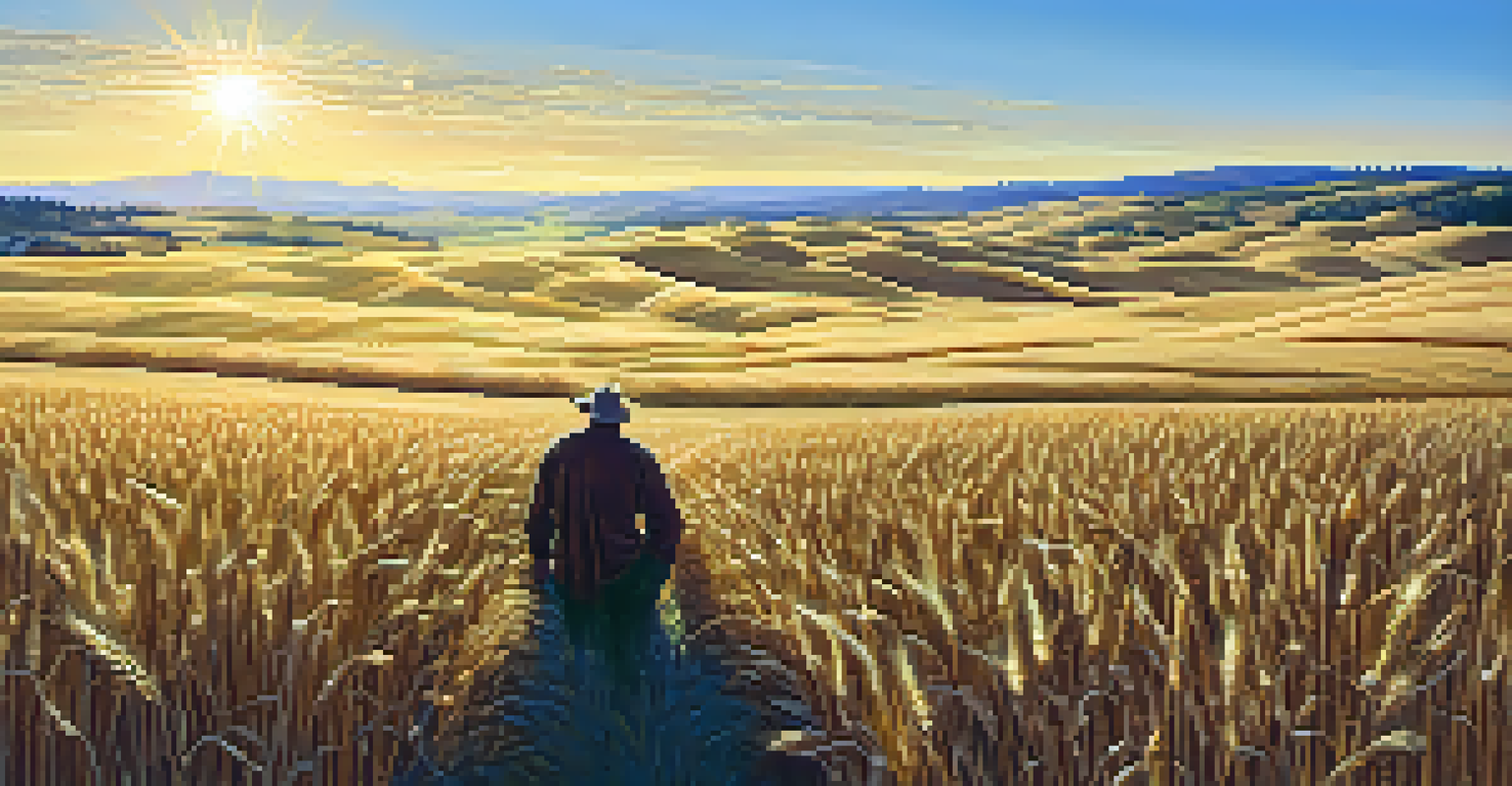Top 10 Local Crops Grown in Washington State

1. Apples: The Evergreen State's Pride
Washington is famously known as the leading apple producer in the U.S., with over 200 varieties cultivated. The climate, particularly the warm days and cool nights, creates the perfect conditions for apples to thrive. From the tart Granny Smith to the sweet Fuji, these apples are not just delicious but also a vital part of the local economy.
Farmers are the backbone of our communities, and their hard work provides us with the food we eat every day.
The apple harvest typically peaks in the fall, making it a prime time for local festivals celebrating this beloved fruit. Many orchards offer pick-your-own experiences, inviting families to enjoy the outdoors and gather fresh apples straight from the tree. This connection to the land is a cherished aspect of Washington's agricultural identity.
Beyond consumption, apples also play a role in local products, such as cider and applesauce, showcasing the versatility of this crop. With farms scattered across the state, it's easy to find fresh, locally-grown apples at farmers' markets and grocery stores. Truly, Washington's apples are a testament to the hard work and dedication of its farmers.
2. Wheat: A Staple of Washington's Agriculture
Wheat is one of the most significant crops in Washington, particularly in the eastern part of the state. The Palouse region, with its rolling hills and rich soil, is ideal for growing both soft white wheat and hard red wheat. This crop is not only a staple in local diets but also contributes significantly to exports, making Washington a key player in the global wheat market.

Farmers typically plant wheat in the fall, allowing it to grow over the winter before harvesting in the summer. This cycle is essential for maintaining soil health and ensuring sustainable farming practices. As a result, wheat farms often practice crop rotation to enhance soil fertility and reduce pests.
Washington: A Hub for Diverse Crops
The state thrives as a leading producer of apples, wheat, cherries, and more, showcasing its agricultural diversity.
Washington's wheat is used in a variety of products, from bread to pasta, providing a foundation for many meals. The state's commitment to quality ensures that the wheat produced meets high standards, benefiting both local consumers and international markets. This crop is a shining example of Washington's agricultural success.
3. Cherries: A Sweet Summer Delight
Washington's cherry season is a highly anticipated time of year, particularly for lovers of this sweet, juicy fruit. The state is the second-largest producer of cherries in the nation, boasting both sweet and tart varieties. The warm summers and fertile soil create ideal conditions for these vibrant fruits to flourish.
To cultivate a garden is to walk with God in the morning, and to harvest is to rejoice in His providence.
Cherry picking is a popular activity among locals and tourists alike, providing an opportunity to experience farm life firsthand. Many orchards open their gates during the harvest season, allowing visitors to fill their baskets with fresh cherries. This not only supports local farmers but also fosters a sense of community around the joy of harvesting.
Additionally, Washington cherries are often featured in local festivals, celebrating their short but sweet season. From pies to preserves, these cherries play a role in many culinary traditions. Their vibrant color and flavor make them a true gem of Washington's agricultural bounty.
4. Grapes: The Foundation of Washington's Wine Industry
Washington is increasingly recognized for its wine production, thanks to the diverse grape varieties grown across the state. The warm, dry climate in regions like the Columbia Valley provides perfect conditions for grapes to thrive. With over 1,000 wineries, Washington has become the second-largest wine producer in the U.S., trailing only California.
The state boasts a variety of grapes, including Cabernet Sauvignon, Merlot, and Riesling, each contributing to the rich tapestry of flavors found in Washington wines. Vineyard tours are popular, allowing visitors to sample local wines and learn about the winemaking process. This experience not only supports the local economy but also highlights the artistry involved in crafting fine wines.
Local Festivals Celebrate Harvests
Many crops, such as apples and cherries, are celebrated through local festivals, fostering community connection and support for farmers.
Moreover, the growth of the wine industry has led to an increase in agritourism, drawing visitors from around the world. Wine festivals and events celebrate the harvest and the craftsmanship of local vintners, fostering appreciation for this vital crop. Washington's grapes are more than just a crop; they're a part of the state's cultural identity.
5. Potatoes: A Versatile Crop for Every Table
Washington ranks among the top potato-producing states in the U.S., thanks to its diverse growing conditions. The Columbia Basin, with its rich volcanic soil and ample irrigation, is particularly suited for cultivating this versatile crop. Potatoes grown here are used for everything from fries to chips, making them a staple in many households.
Farmers typically plant potatoes in the spring, and the harvest occurs in late summer to early fall. The state’s commitment to sustainable farming practices ensures that potato production remains environmentally friendly. This focus on sustainability is crucial for maintaining the health of the soil and the quality of the crop.
Additionally, Washington's potato industry supports numerous jobs, from farming to processing and distribution. Local festivals often celebrate the potato harvest, showcasing the many ways this humble vegetable can be prepared. With its widespread appeal and adaptability, the potato is truly a cornerstone of Washington's agricultural landscape.
6. Berries: A Burst of Flavor in Every Bite
Washington is known as the 'Berry Capital of the World,' producing an impressive array of berries, including blueberries, raspberries, and strawberries. The state's climate, characterized by mild temperatures and ample rainfall, creates ideal conditions for berry cultivation. Each summer, farmers markets overflow with fresh, locally-picked berries, drawing in berry lovers from all around.
Berry picking is a beloved activity for families, providing a chance to enjoy the outdoors while supporting local agriculture. Many farms offer U-Pick options, allowing visitors to gather their own berries straight from the bush. This hands-on experience promotes a deeper connection to the food we eat and the farmers who grow it.
Sustainable Practices Enhance Quality
Washington farmers prioritize sustainable practices to ensure the high quality and environmental friendliness of their diverse crops.
Moreover, Washington berries are not only delicious but also packed with nutrients, making them a popular choice for health-conscious consumers. They play a significant role in local cuisine, featuring in everything from desserts to salads. The vibrant colors and flavors of Washington's berries truly embody the spirit of the state's agricultural bounty.
7. Onions: A Flavorful Addition to Washington's Produce
Onions are another important crop in Washington, particularly in the eastern regions where the climate is conducive to growing this flavorful vegetable. The state is known for its sweet onions, especially the Walla Walla variety, which are celebrated for their mild, sweet taste. These onions have earned their place in the hearts and kitchens of many home cooks.
Typically harvested in late spring to early summer, Washington onions are a staple in local cuisine and are often featured in farmers' markets across the state. The sweet onions are especially popular for grilling, salads, and sandwiches, adding a burst of flavor to dishes. Their versatility makes them a favorite among chefs and food enthusiasts alike.

Furthermore, the onion industry supports local economies and provides numerous job opportunities, from farming to packing and distribution. Festivals celebrating the onion harvest bring communities together, showcasing local produce and culinary talent. In every dish, Washington's onions add a unique flavor that reflects the state's agricultural heritage.
8. Corn: A Summer Favorite in Washington State
Corn, particularly sweet corn, is a beloved crop during the summer months in Washington. The state's warm, sunny days are perfect for growing this popular vegetable, making it a staple at summer barbecues and farmers' markets. Sweet corn is often harvested in late summer, bringing joy to many who look forward to its fresh, sweet flavor.
Local farms often offer U-Pick corn options, allowing families to experience the fun of picking their own ears of corn. This hands-on experience fosters a connection to the land and supports local agriculture. Plus, nothing beats the taste of corn picked fresh and cooked on the grill.
In addition to being enjoyed fresh, Washington corn is used in a variety of dishes, from salsas to casseroles. The state's commitment to quality and sustainable farming practices ensures that the corn produced is not only delicious but also environmentally friendly. Washington's corn truly represents the essence of summer and the bounty of local agriculture.